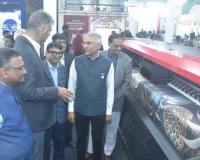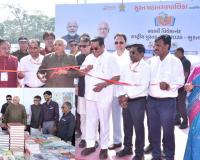Gujarat Government Introduces Textile Policy 2024 with Subsidy Boost for the Industry

Surat, October 11: After a gap of two and a half years since the Central Government discontinued the Technology Upgradation Fund Scheme (TUFS), the Gujarat Government has announced subsidies ranging from 10% to 35% on capital investment for the textile sector. The new Gujarat Textile Policy 2024 was launched by Chief Minister Bhupendra Patel at the Mahatma Mandir in Gandhinagar on Tuesday. This policy is expected to revitalize the textile industry, offering substantial benefits and creating significant employment opportunities. Industry leaders have shared their reactions to this policy, which aims to boost the textile sector.
Textile Policy Beneficial for All Industry Players: Ashok Jariwala
Reacting to the new policy, Ashok Jariwala, head of FOGWA and a leading figure in the weaving industry, expressed that the Gujarat Government has considered the interests of all stakeholders in the policy. He noted that while larger industries would benefit more, smaller businesses would also see some advantages. He acknowledged that the policy may not be as lucrative as Maharashtra’s, but for a state where such benefits were previously non-existent, this policy is like a Diwali gift for the textile sector.
Focus on Larger Industries: Mahendra Ramoliya
Weaver leader Mahendra Ramoliya expressed concerns that the policy is more beneficial to larger industries, with little for smaller businesses. He highlighted the difficulties faced by small enterprises, especially in today’s inflationary environment, suggesting that the policy should have provided more support for smaller businesses. He also raised concerns about delays in subsidy distribution, pointing out that some businesses have been waiting for subsidies since 2019. He compared the situation to offering someone a gift but never delivering it, questioning the effectiveness of such policies.
A Boost to the Textile Industry: Gulab Singh Rajput
Textile entrepreneur Gulab Singh Rajput welcomed the new policy, saying it would accelerate growth in the sector. The announcement of subsidies ranging from 10% to 35% for new investments in machinery is a positive step, he said, adding that the decision to offer power tariffs at ₹1 per unit will further benefit businesses. He acknowledged that while larger businesses would benefit more due to their higher capital investments, smaller enterprises would also see some advantages, though on a lesser scale.
Textile Policy Should Be Effective from Early 2024: Vinay Agarwal
Vinay Agarwal, a prominent yarn trader and leader of the Nylon Spinners Association, suggested that the policy should be made effective from January 1, 2024, so that businesses that have expanded or set up new operations in the past nine months can also benefit. He emphasized that the policy would provide momentum to the textile industry, encouraging businesses to expand within Gujarat instead of looking to places like Navapura in Maharashtra or Silvassa in the Union Territory.
The Gujarat Textile Policy 2024 aims to provide a much-needed push to the textile industry by incentivizing new investments and offering financial support, ensuring that both large and small enterprises can benefit. The policy is expected to positively impact the overall growth and employment generation within the state’s textile sector.






